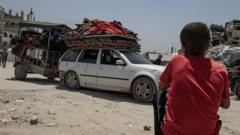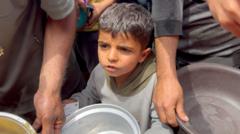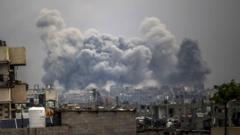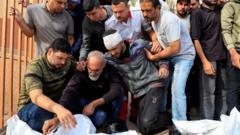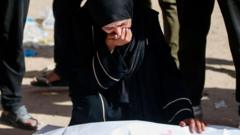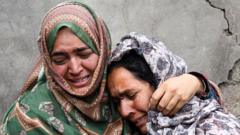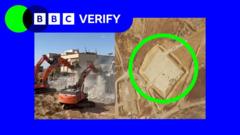As humanitarian aid dwindles, the livelihoods of thousands in Gaza hang in the balance amid increasing international pressure for relief.
**Food Crisis Intensifies in Gaza as Community Kitchens Face Imminent Shutdown**
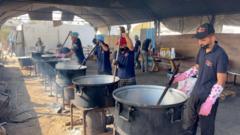
**Food Crisis Intensifies in Gaza as Community Kitchens Face Imminent Shutdown**
Growing despair grips Gaza as community kitchens warn of food shortages after two months of Israeli blockade.
In the heart of Khan Younis, community kitchens reliant on dwindling resources are struggling to mitigate the escalating humanitarian crisis in Gaza. Operated by the American Near East Refugee Aid (Anera), these kitchens are vital for feeding approximately 6,000 people daily. They are transitioning from meals once rich in protein and vegetables to basic sustenance, resorting to rice and lentils as vital food supplies from local markets dwindle due to an ongoing blockade.
The blockade, imposed by Israel two months ago, has significantly restricted the entry of essential goods, including food, fuel, and medicine. This action came on the heels of Israel resuming military operations against Hamas, which has led to devastating humanitarian consequences. As local aid organizations report exhausting their food supplies, the urgency for a resolution grows.
The UN has raised alarms, asserting that blocking humanitarian aid constitutes collective punishment and could be classified as a war crime. Humanitarian chief Tom Fletcher has called for the unimpeded flow of aid, emphasizing that civilians should not bear the brunt of political negotiations. As hundreds of thousands of Gazans become increasingly dependent on community kitchens, the situation becomes ever more precarious. Stocks are depleting, and officials warn they may run out of provisions within a mere two weeks if the blockade persists.
Aid workers like Sami Matar, leading the Anera initiative, express deep concern for the future of these essential services. Once receiving a steady influx of food deliveries, they now find their warehouses nearly bare. With prices soaring and cooking wood scarce, the means to sustain the population diminish rapidly.
On the ground, individuals endure significant hardships. Displaced families struggle with basic necessities, resorting to desperate measures to cook food, while many remain grateful even for a heating meal distributed by the kitchens. The gravity of the situation is underscored by an elderly man's relief at receiving a minimal amount of food, juxtaposed against the backdrop of acute despair threaded throughout Gaza.
The ongoing conflict had already displaced over 90% of Gaza's population, leaving countless individuals vulnerable and reliant on dwindling aid. The prospect of increased international scrutiny and pressure on Israel to lift the blockade highlights the urgency of addressing humanitarian needs. Tensions are high as various nations, including the United States, urge Israel to ease restrictions and allow the influx of crucial supplies.
As the Israeli government insists on monitoring aid flows and claims there is no shortage of assistance available, countless humanitarian organizations point to insufficient deliveries and growing needs on the ground. Children in camps, visibly malnourished, serve as stark reminders of the urgent need for intervention.
Amid this chaos, the workers of Anera remain resilient. They convey an urgent appeal for assistance while calling for the reopening of Gaza's crossings to stave off further catastrophe. The future remains uncertain as voices from within the beleaguered territory demand immediate action before starvation becomes an untenable reality.
The blockade, imposed by Israel two months ago, has significantly restricted the entry of essential goods, including food, fuel, and medicine. This action came on the heels of Israel resuming military operations against Hamas, which has led to devastating humanitarian consequences. As local aid organizations report exhausting their food supplies, the urgency for a resolution grows.
The UN has raised alarms, asserting that blocking humanitarian aid constitutes collective punishment and could be classified as a war crime. Humanitarian chief Tom Fletcher has called for the unimpeded flow of aid, emphasizing that civilians should not bear the brunt of political negotiations. As hundreds of thousands of Gazans become increasingly dependent on community kitchens, the situation becomes ever more precarious. Stocks are depleting, and officials warn they may run out of provisions within a mere two weeks if the blockade persists.
Aid workers like Sami Matar, leading the Anera initiative, express deep concern for the future of these essential services. Once receiving a steady influx of food deliveries, they now find their warehouses nearly bare. With prices soaring and cooking wood scarce, the means to sustain the population diminish rapidly.
On the ground, individuals endure significant hardships. Displaced families struggle with basic necessities, resorting to desperate measures to cook food, while many remain grateful even for a heating meal distributed by the kitchens. The gravity of the situation is underscored by an elderly man's relief at receiving a minimal amount of food, juxtaposed against the backdrop of acute despair threaded throughout Gaza.
The ongoing conflict had already displaced over 90% of Gaza's population, leaving countless individuals vulnerable and reliant on dwindling aid. The prospect of increased international scrutiny and pressure on Israel to lift the blockade highlights the urgency of addressing humanitarian needs. Tensions are high as various nations, including the United States, urge Israel to ease restrictions and allow the influx of crucial supplies.
As the Israeli government insists on monitoring aid flows and claims there is no shortage of assistance available, countless humanitarian organizations point to insufficient deliveries and growing needs on the ground. Children in camps, visibly malnourished, serve as stark reminders of the urgent need for intervention.
Amid this chaos, the workers of Anera remain resilient. They convey an urgent appeal for assistance while calling for the reopening of Gaza's crossings to stave off further catastrophe. The future remains uncertain as voices from within the beleaguered territory demand immediate action before starvation becomes an untenable reality.


